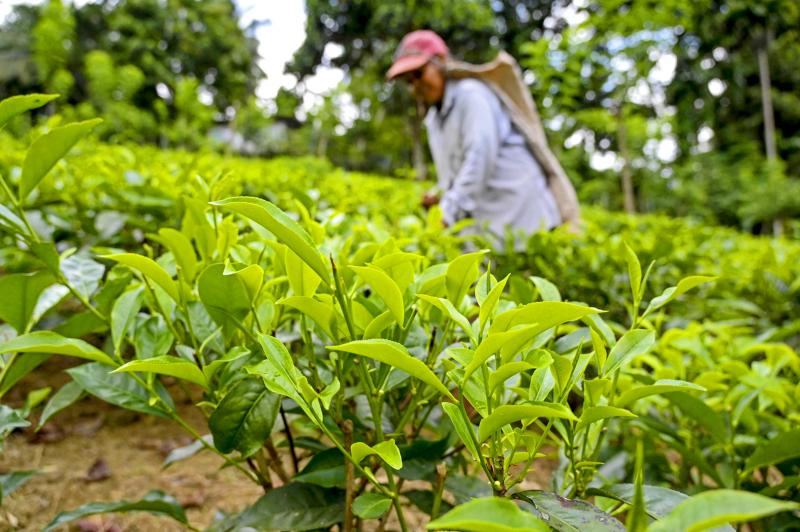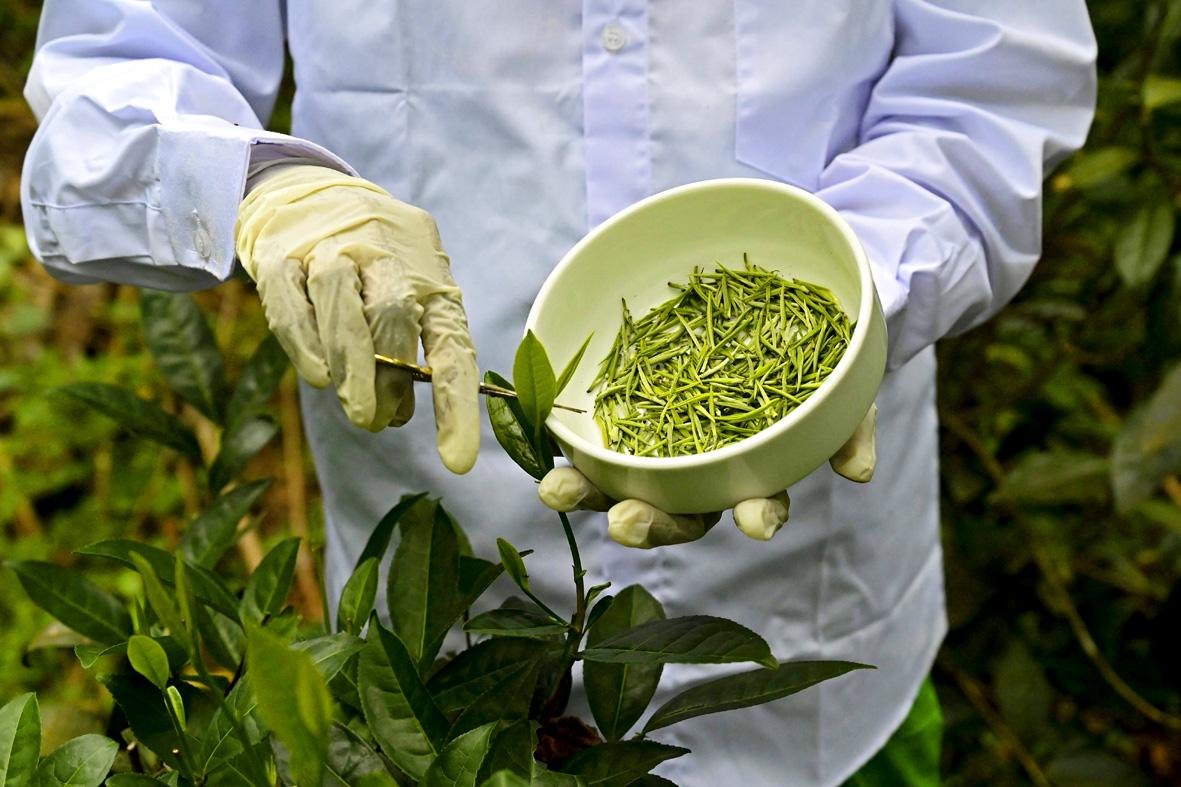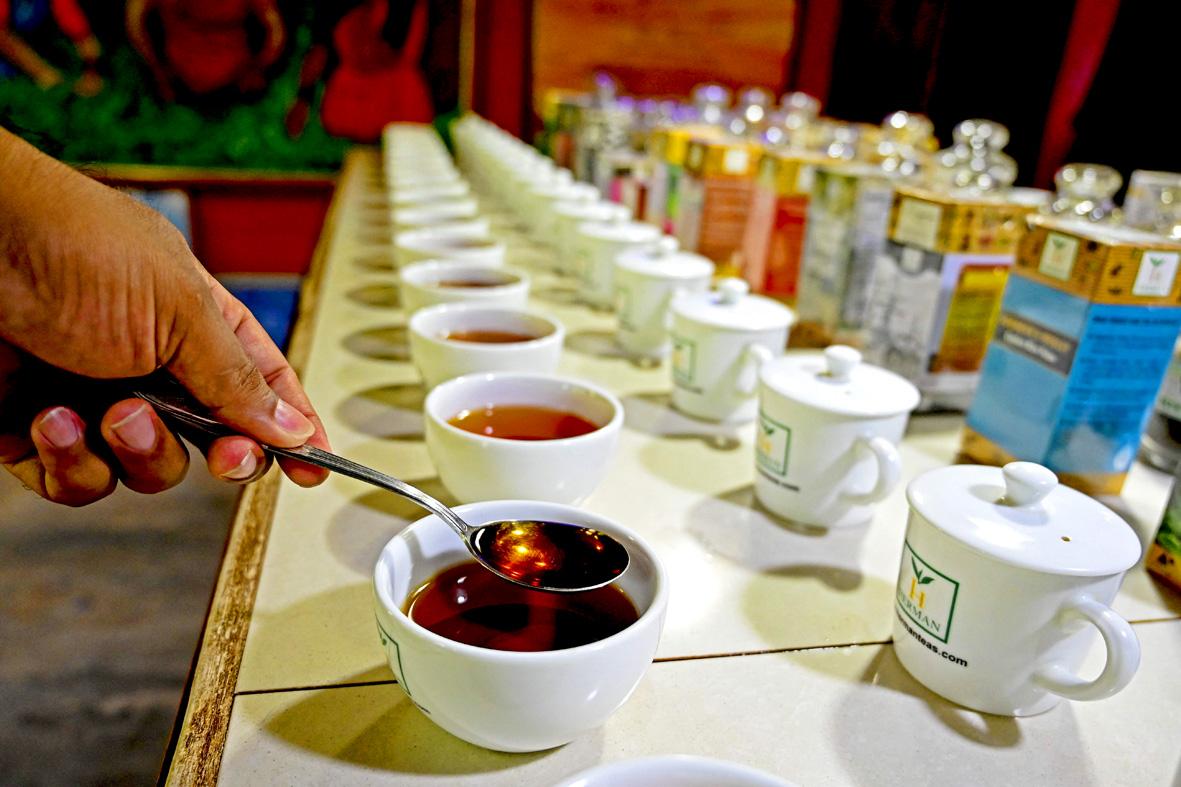Sri Lanka’s drive to become the world’s first 100 percent organic food producer threatens its prized tea industry and has triggered fears of a wider crop disaster that could deal a further blow to the beleaguered economy.
President Gotabaya Rajapaksa banned chemical fertilizers this year to set off his organic race but tea plantation owners are predicting crops could fail as soon as next month, with cinnamon, pepper and staples such as rice also facing trouble.
Master tea maker Herman Gunaratne, one of 46 experts picked by Rajapaksa to guide the organic revolution, fears the worst.

Photo: AFP
“The ban has drawn the tea industry into complete disarray,” Gunaratne said at his plantation in Ahangama, in rolling hills 160km south of Colombo.
“The consequences for the country are unimaginable.”
The 76-year-old, who grows one of the world’s most expensive teas, fears that Sri Lanka’s average annual crop of 300 million kilograms will be slashed by half unless the government changes course.

Photo: AFP
Sri Lanka is in the grip of a pandemic-induced economic crisis, with gross domestic product contracting more than three percent last year, and the government’s hopes of a return to growth have been hit by a new coronavirus wave.
Fertilizer and pesticides are among a host of key imports — including vehicles and spare parts — the government has halted as it battles foreign currency shortages.
FOOD SECURITY ‘COMPROMISED’

Photo: AFP
But tea is Sri Lanka’s biggest single export, bringing in more than US$1.25 billion a year — accounting for about 10 percent of the country’s export income.
Rajapaksa came to power in 2019 promising subsidized foreign fertilizer but did a U-turn arguing that agro chemicals were poisoning people.
Gunaratne, whose Virgin White tea sells for US$2,000 a kilo, was removed last month from Rajapaksa’s Task Force for a Green Socio-Economy after disagreeing with the president.
He says the country’s Ceylon tea has some of the lowest chemical content of any tea and poses no threat.
The tea crop hit a record 160 million kilos in the first half of this year thanks to good weather and old fertilizer stocks but the harvest started falling in July.
Sanath Gurunada, who manages organic and classic tea plantations in Ratnapura, southeast of Colombo, said that if the ban continues “the crop will start to crash by October and we will see exports seriously affected by November or December.”
He said his plantation maintained an organic section for tourism, but it was not viable. Organic tea costs 10 times more to produce and the market is limited, Gurunada added.
W.A. Wijewardena, a former central bank deputy governor and economic analyst, called the organic project “a dream with unimaginable social, political and economic costs.”
He said Sri Lanka’s food security had been “compromised” and that without foreign currency it is “worsening day by day.”
JOBS AT STAKE
Experts say the problem for rice is also acute while vegetable growers are staging near daily protests over reduced harvests and pest-affected crops.
“If we go completely organic, we will lose 50 percent of the crop, [but] we are not going to get 50 percent higher prices,” Gunaratne said.
Tea plantation owners say that on top of the loss of earnings, a crop failure would cause huge unemployment as tea leaves are still picked by hand.
“With the collapse of tea, the jobs of three million people will be in jeopardy,” the Tea Factory Owners Association said in a statement.
Plantations minister Ramesh Pathirana said the government hoped to provide organic compost in place of chemical fertilizers.
“Our government is committed to providing something good for the tea industry, fertilizer-wise,” he said.
Farmers say Sri Lanka’s exports of cinnamon and pepper will also be affected by the organic drive.
Sri Lanka supplies 85 percent of the global market for Ceylon Cinnamon, one of the two leading types of the spice, according to UN figures.
Still, Rajapaksa remains confident in his course, telling a recent UN summit that he was confident that his organic initiative will ensure “greater food security and nutrition” for Sri Lankans.
He has called on other countries to follow Sri Lanka’s move with the “bold steps required to sustainably transform the world food system.”

Jacques Poissant’s suffering stopped the day he asked his daughter if it would be “cowardly to ask to be helped to die.” The retired Canadian insurance adviser was 93, and “was wasting away” after a long battle with prostate cancer. “He no longer had any zest for life,” Josee Poissant said. Last year her mother made the same choice at 96 when she realized she would not be getting out of hospital. She died surrounded by her children and their partners listening to the music she loved. “She was at peace. She sang until she went to sleep.” Josee Poissant remembers it as a beautiful

March 2 to March 8 Gunfire rang out along the shore of the frontline island of Lieyu (烈嶼) on a foggy afternoon on March 7, 1987. By the time it was over, about 20 unarmed Vietnamese refugees — men, women, elderly and children — were dead. They were hastily buried, followed by decades of silence. Months later, opposition politicians and journalists tried to uncover what had happened, but conflicting accounts only deepened the confusion. One version suggested that government troops had mistakenly killed their own operatives attempting to return home from Vietnam. The military maintained that the

Before the last section of the round-the-island railway was electrified, one old blue train still chugged back and forth between Pingtung County’s Fangliao (枋寮) and Taitung (台東) stations once a day. It was so slow, was so hot (it had no air conditioning) and covered such a short distance, that the low fare still failed to attract many riders. This relic of the past was finally retired when the South Link Line was fully electrified on Dec. 23, 2020. A wave of nostalgia surrounded the termination of the Ordinary Train service, as these train carriages had been in use for decades

Lori Sepich smoked for years and sometimes skipped taking her blood pressure medicine. But she never thought she’d have a heart attack. The possibility “just wasn’t registering with me,” said the 64-year-old from Memphis, Tennessee, who suffered two of them 13 years apart. She’s far from alone. More than 60 million women in the US live with cardiovascular disease, which includes heart disease as well as stroke, heart failure and atrial fibrillation. And despite the myth that heart attacks mostly strike men, women are vulnerable too. Overall in the US, 1 in 5 women dies of cardiovascular disease each year, 37,000 of them